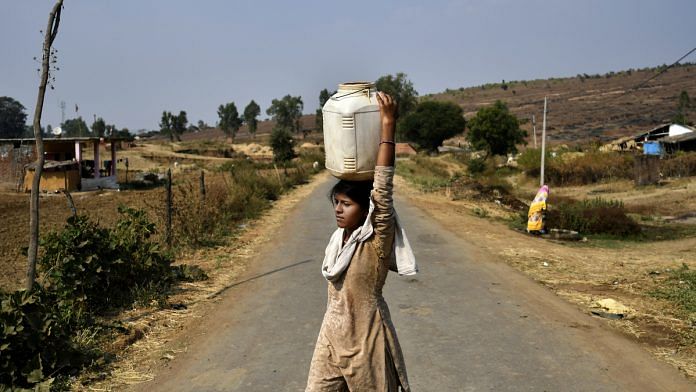New Delhi: From learning how to test water quality to repairing hand pumps and fixing broken taps, women in rural India will play a greater role in implementing and managing water supply infrastructure as part of the Narendra Modi government’s flagship Har Ghar Jal Se Nal scheme.
The scheme promises piped water in every rural household by 2024.
To begin with, the government has made it mandatory that each paani samiti (water committee) — to be constituted by gram sabhas for water supply management — should have 50 per cent women members.
The paani samitis will not only decide the kind of infrastructure required for every village but also fix charges to be paid by residents for piped water.
This is not all. In every village where the water supply programme is implemented, women will also be provided training for masonry, electrical and motor mechanic work.
“This will ensure that women are able to carry out basic plumbing and repair work with competence. These jobs are not gender specific,” said a senior official at the Department of Drinking Water and Sanitation that functions under the Ministry of Jal Shakti.
The ministry has already tied up with the Pradhan Mantri Kaushal Vikas Kendra for skilling and training of plumbers, electricians, masons and motor mechanics to implement the Har Ghar Nal Se Jal scheme, under the Jal Jeevan Mission, in villages.
“At present, 15,000 villagers are undergoing training,” the official added.
This will, however, not be the first time that women will be trained to do plumbing and masonry job. When the potable water supply scheme was launched in Gujarat in early 2000, women self-help groups were entrusted with repairing hand pumps.
Besides, women will also be trained to test piped water for biological and chemical contamination.
The operational guidelines for Har Ghar Nal Se Jal mandates that five persons, especially women, in every village will be trained to use field test kits to know the extent of contamination. If a water sample test is positive, it will have to be given to the nearby water quality testing laboratory for confirmation.
“The whole idea is to facilitate women’s participation at all levels, from planning to implementation, management, operation and maintenance of in-village water supply. It will go a long way in empowering them,” said Bharat Lal, Additional Secretary, Department of Drinking Water and Sanitation.
Also read: Amit Shah-led ministers’ group to decide the fee rural India will pay for piped water
Special thrust on SC/ST communities
Those belonging to the SC/ST communities will get adequate representation in implementing the Har Ghar Nal Se Jal scheme.
In the paani samiti, 25 per cent representatives will have to be from the SC/ST communities. Also, while villagers will bear 10 per cent of the capital cost of a water supply infrastructure either in cash or kind (in the form of labour), for those belonging to SC/ST community it has been fixed at five per cent.
The scheme envisages providing every household with 55 litre per capita per day (lpcd) drinking water of prescribed quality on a regular basis through a functional household tap.
Currently, out of total 17.87 crore rural households, only 3.28 crore or 18.33 per cent have tap water connection.
The programme has a total outlay of Rs 3.6 lakh crore for five years, which will be implemented in partnership with states whose share is Rs 1.52 lakh crore.
Also read: Cow start-ups, Har Ghar Gai, CSR for shelters – Modi govt’s new idea to boost rural economy



